DUBAI: IMF Managing Director Christine Lagarde said, “Unfortunately, the region has yet to fully recover from the global financial crisis and other big economic dislocations over the past decade”. “Among oil importers, (economic) growth has picked up, but it is still below pre-crisis levels,” she told the Arab Fiscal Forum in Dubai.Lagarde said public debt among Arab oil importing nations had increased from 64 percent to 85 percent of Gross Domestic Product in the decade since 2008. Nearly half of these countries now have public debt of over 90 percent of GDP, she said. Public debt has rapidly increased in many Arab countries since the 2008 global financial crisis, due to persistently high budget deficits, the International Monetary Fund warned Saturday.
Public debt among oil exporters — including the six-nation Gulf Cooperation Council — rose from 13 percent of GDP to 33 percent of GDP, accelerated by the crash in oil prices around five years ago, Lagarde said. “The oil exporters have not fully recovered from the dramatic oil price shock of 2014,” she said.
“Modest growth continues, but the outlook is highly uncertain.” Lagarde said oil producing countries should look to renewable energy in the coming decades, in line with the Paris Agreement on climate change, which stipulates a reduction in greenhouse emissions.
The IMF last month lowered its economic growth forecasts for Saudi Arabia — the world’s top crude exporter — and the wider Middle East and North Africa region due to a renewed fall in oil prices, low output and geopolitical tensions.
Lagarde welcomed both spending and revenue reforms, including the introduction of a value added-tax (VAT) and excise duty by Saudi Arabia and the United Arab Emirates. But she urged more reforms, anti-corruption measures and transparency. “The economic path ahead for the region is challenging,” she added. (Agence France-Presse)
ISLAMABAD: Pakistani Prime Minister Imran Khan will meet International Monetary Fund (IMF) chief Christine Lagarde in Dubai on Sunday for talks on issues which have held up bailout negotiations, a Pakistani minister said on Saturday.
Pakistan is seeking its 13th bailout since the late 1980s to deal with a current account deficit that threatens to trigger a balance of payments crisis, but talks have been delayed by difficulties in reconciling IMF reform demands with Islamabad’s fears the push is too drastic and could hurt economic growth.
Information Minister Fawad Chaudhry told Reuters Khan will meet IMF Managing Director Christine Lagarde on the sidelines of the World Government Summit in Dubai.
“This will give us a chance to understand the IMF views and we will be able to give our version to Lagarde,” said Chaudhry, who will accompany Khan to Dubai along with Finance Minister Asad Umar.
Chaudhry said Pakistan wants any agreed bailout package, which would be the country’s second IMF bailout since 2013, to be the nation’s last such economic rescue by the IMF.
Officials had expected talks to conclude in November but they have been delayed as Islamabad harbors concerns that the programme could derail the economy and Khan’s plans for his term in office.
Pakistan has in the meantime sought financial assistance from Middle Eastern allies such as Saudi Arabia and the United Arab Emirates, who have loaned it in excess of $10 billion to ease the pressure on its dwindling foreign currency reserves.
“The problem is not the (IMF) deal, the problem is the condition attached to the deal,” Chaudhry said.
“We don’t want conditions that hurt Pakistan’s growth prospects. We want a fair deal that can actually help Pakistan in the short term, without affecting our long-term economic goals.”
The IMF talks come amid a worsening macroeconomic outlook, with growth expectations slashed for the current fiscal year to about 4 percent from 6 percent previously forecast.
On Saturday, Pakistan also revised its growth figures for the last financial year to 5.2 percent from a previously reported 5.8 percent, after a sharp cut in the figure for large-scale manufacturing, the statistics office said.
When the original estimate was reported in April by the government of Prime Minister Shahid Khaqan Abbasi it was hailed as the strongest growth in 13 years.
Before the revisions to last year’s GDP figures, Pakistan’s deficit to GDP ratio, estimated at 5.8 percent in 2017-18, was expected to hit 6.9 percent this year, according to IMF data.
Reuters
NEW YORK – The owner of U.S. tabloid newspaper the National Enquirer pushed back on Friday against accusations of “extortion and blackmail” from Amazon.com Inc Chief Executive Jeff Bezos, saying its reporting on an extramarital relationship involving the world’s richest man was lawful and it would investigate his claims.
The U.S. attorney’s office in Manhattan is reviewing whether the alleged extortion violated a non-prosecution agreement, a person familiar with the matter said, confirming an earlier report by Bloomberg News.
Bezos on Thursday accused American Media Inc (AMI) of trying to blackmail him with the threat of publishing “intimate photos” he allegedly sent to his girlfriend unless he said in public that the American supermarket tabloid’s reporting on him was not politically motivated.
The U.S. attorney’s office in Manhattan is reviewing whether the alleged extortion violated a non-prosecution agreement, a person familiar with the matter said, confirming an earlier report by Bloomberg News.
AMI signed the agreement with federal prosecutors last year in connection with a $150,000 hush-money payment to a former Playboy model who claims she had an affair with U.S. President Donald Trump. Trump denies the affair.
Bezos opened an investigation into how the messages could have ended up in the hands of the tabloid, led by longtime security consultant Gavin de Becker. De Becker told media that the leak was politically motivated.
The agreement can be voided if AMI commits any crimes. If the agreement is nullified, AMI or its executives could face prosecution for the hush payment and its conduct with Bezos, legal experts said. AMI and its CEO David Pecker have had close links to Trump, who has attacked Bezos, Amazon and the newspaper he owns privately, the Washington Post, on Twitter.
“American Media believes fervently that it acted lawfully in the reporting of the story of Mr. Bezos,” the company said in a statement. Bezos and his wife announced last month that they were divorcing after 25 years of marriage. That same day, the National Enquirer touted it was publishing alleged intimate text messages between Bezos and Lauren Sanchez, a former television anchor whom he was said to be dating.
Bezos opened an investigation into how the messages could have ended up in the hands of the tabloid, led by longtime security consultant Gavin de Becker. De Becker told media that the leak was politically motivated.
In a blog post on Thursday, Bezos cited an email from AMI deputy general counsel, Jon Fine, to a lawyer representing de Becker. In it, AMI proposed a public acknowledgment from Bezos and de Becker that “they have no knowledge or basis for suggesting that (AMI’s) coverage was politically motivated or influenced by political forces.” In return for such an acknowledgment, according to the email, AMI offered “not to publish, distribute, share, or describe unpublished texts and photos,” Bezos said.
Bezos said the statement AMI was proposing was false and described the offer as an “extortionate proposal.” Bezos, Fine, and de Becker were not immediately available for comment. Amazon declined to comment. Shares of the world’s largest online retailer were down 1.8 percent at $1,584.74.
But criminal defense lawyer Page Pate said what AMI sought to gain from Bezos was “too fuzzy” and would not be enough to put them in violation of the non-prosecution deal. “I don’t think there is a clear enough hook to show that what they wanted from Bezos was a thing of value,” Pate said.
Extortion typically involves an effort to obtain property, services, money or some other benefit by threatening violence, reputational harm or other injury, although definitions can vary across state and federal laws.
In Florida, where American Media is based, extortion includes maliciously threatening targets with disgrace, or to expose their secrets. In Washington state, where Amazon is based, it includes threatening to expose secrets that may subject targets to hatred, contempt or ridicule, or reveal information that the targets wanted to conceal.
Federal law defines extortion as someone seeking or actually obtaining “property” through the “wrongful use” of actual or threatened force, violence or fear. “Property” can be something of value not limited to a tangible object or money.
Elie Honig, a former prosecutor, argued in a column on CNN that the actions alleged by Bezos amounted to extortion because the act of stopping Bezos’ investigation was of value to AMI and AMI’s threat of exposing lurid photos met the “wrongful” test.
But criminal defense lawyer Page Pate said what AMI sought to gain from Bezos was “too fuzzy” and would not be enough to put them in violation of the non-prosecution deal. “I don’t think there is a clear enough hook to show that what they wanted from Bezos was a thing of value,” Pate said.
On Friday, AMI said that at the time of Bezos’ allegations it was “in good faith negotiations to resolve all matters with him.” “In light of the nature of the allegations published by Mr. Bezos, the Board has convened and determined that it should promptly and thoroughly investigate the claims. Upon completion of that investigation, the Board will take whatever appropriate action is necessary,” it added. (Reuters)
KATHMANDU: The government has halted the work permit of Nepali migrant workers leaving for five destination countries citing security reasons.
Similarly, the government has adopted strict measures on Nepali migrant workers bound for Gulf countries and Malaysia.
Likewise, the Ministry has also imposed a ban on the visa renewal of Nepali youths returning home from these five countries.
The work permit for five destination countries, including Afghanistan, Libya, Iraq, Kenya and Syria have been halted due to conflicts taking place in those countries, Dilip Kumar Chapagain, Director General of the Department of Foreign Employment told Khabarhub.
Likewise, the Ministry has also imposed a ban on the visa renewal of Nepali youths returning home from these five countries.
“Since we are analyzing the situation of those countries, we have currently suspended the visa process,” said Dilip Kumar Chapagain, Director General of the Department Foreign Employment.
Around 100 service seekers visit the Department of Labor seeking work permit on a daily basis.
JAJARKOT: Beekeepers of Kalpat of Nalgad Municipality-1 has started exporting their home-made honey to the international market. Nahakuli Organic Herbal Agro Pvt. Ltd has started exporting the local products in the international market. The company has already collected 2,000 kgs of honey to export in Australia, America, United Arab Emirates and South Korea.
With the growing demand of honey in the market, the traders have increased the price to Rs. 700 per kg.
Hari Bahadur Budha, the manager of the company informed that Super World Traders has assessed the quality and the weight of the honey for its export to the international market. The company is waiting for the consignment papers from the Division Forest Office.
The Chief of the Nalgad Agriculture Branch Office, Mahesh Kumar Bista said honey production in Nalgad has increased by 15 per cent this year as compared to last year. Honey production in the district last year was 20 metric tons. Similarly, with the growing demand of honey in the market, the traders have increased the price to Rs. 700 per kg. Earlier, the price was Rs. 500.
The beekeepers in Jajarkot have been doing commercial bee-keeping since three decades and the Nalgad municipality has declared the Kalpat area as the pocket area for honey production in a bid to promote commercial bee keeping.
DOLPA: Massive snowfall that occurred in the Karnali region has crippled air services. The Jufal airport in the district could not operate due to accumulation of snow on the airfield. Heavy snowfall that occurred from this morning has also obstructed the regular flights to and from the airport.
Thick snow that has piled up on the runway has obstructed the landing while extremely poor visibility has affected the flights to and from the airport, Bal Kumar Sharma Civil Aviation office Jufal chief said. There were slim chances of resuming the air services for few days. The snowfall and chilling cold have created difficulties to the locals. The same scenario has been seen in Jumla, Humla and Mugu districts as well.
Meanwhile, the preparation classes being run for students appearing in the SEE exams have also been affected due to cold. The students are failing to attend the classes at school, said Deepak Parajuli, a teacher at Janaprabha secondary school Liku, headmaster.
HONGKONG: The death of Gerald Cotton, 30, the Chief Operating Officer (CEO) of Quadirga and co-founder of Canada’s biggest crypto currency exchange, having a sole password, has left a huge stash of crypto currencies locked off from the people who own them. He died because of complications arising from Crohn’s disease while traveling in India, according to CNN.
Quadriga, which is based on Vancouver, has said it’s unable to gain access to $145 million of bitcoin and other digital assets, according to CNN. Many of the digital currencies held by Quadriga are stored offline in accounts known as “cold wallets,” a way of protecting them from hackers. Cotten is the only person with access to the wallets, according to the company.
Cotten’s death has plunged Quadriga into crisis and left it struggling to figure out how to refund more than 100,000 of its users. On Tuesday, the company said it was granted creditor protection in the Nova Scotia Supreme Court as it tries to sort out its financial mess. Cotten’s widow, Jennifer Robertson, said that the laptop that Cotten used to run the currency exchange is encrypted, according to a copy of her affidavit posted online by cryptocurrency news site CoinDesk.
Quadriga also owes about 70 million Canadian dollars ($53 million) in cash that it’s unable to pay back, Jeniffer said, citing difficulties accessing funds through the traditional banking system, CNN has said.
(With inputs from CNN)
KATHMANDU: A section of manpower operators have been pressuring the government to set up Qatar visa center in Nepal to fulfill their vested interest.
Minister for Labor, Employment and Social Security Gokarna Bista had earlier issued an order to halt the opening of the Qatar visa center that was said to be opened in November last year.
Qatar had made final preparations to open a visa center in Nepal to minimize the problems faced by migrant workers heading for Qatar. All the infrastructures for the purpose were being developed inside the Qatari Embassy in Kathmandu.
Manpower operators including, Tek Bahadur Gurung, former Minister of State for Labor and the owner of Himalayan Manpower Pvt. Ltd., Ramesh Koirala, Nepali Ambassador to Qatar and Hem Raj Gurung, the owner of SOS Manpower Pvt. Ltd., among others are lobbying to open the visa center.
Once the visa center opens without signing the labor treaty, the manpower operators can charge high amount of fee to the Qatar-bound Nepali workers in the name of health treatment, according to a staff at the Embassy of Nepal in Doha.
According to sources, half a dozen people including non-resident Nepalis in Qatar want the visa center in Kathmandu so that they could extort high fee from Qatar-bound Nepali youths in the name of health checkups and other procedures.
The group is also lobbying the Department of Immigration in Qatar, the Ministry of Law, Justice and Parliamentary Affairs, the Ministry of Labor, Employment and Social Security, staff at the Embassy of Qatar in Nepal and also Biomet, a Singapore-based company licensed for opening a visa center in Nepal.
Qatar had made final preparations to open a visa center in Nepal to minimize the problems faced by migrant workers heading for Qatar. All the infrastructures for the purpose were being developed inside the Qatari Embassy in Kathmandu.
Nepal had signed a labor treaty with Qatar in 2005. Currently, discussions are on with the technical teams of Qatar and Nepal for labor treaty, according to a source at the Ministry of Labor, Employment and Social Security. Earlier, Minister Bista had consulted with Yousuf Bin Mohammed Al-Hail, Qatari ambassador to Nepal.
If the visa center comes into operation, a worker heading for Qatar needs to pay USD 18 to the center before their departure. However, there has been a propaganda that one does not need to pay the visa center, according to a manpower operator.
A Qatar job aspirant has to visit the manpower company for the final labor approval after paying the USD 18 to the visa center. The visa center shall obtain the workers through manpower companies.
However, the workers have been informed that the entire processing is done via the visa center. It is said that the center would conduct health check-up, fingerprints and opening files for those willing to go to work in Qatar and signing the contract after the visa is issued.
The manpower operators say that an aspiring worker needs to pay up to Rs. 7,000 to the visa center.
According to the government record, an estimated of 400,000 Nepali workers are working at various sectors in Qatar, currently.
KATHMANDU: Foreign investors have emphasized on creating an environment that is conducive for bringing in Foreign Direct Investment (FDI) in the country. They have also suggested easing the visa process and work permit-related issues for expatriates in Nepal.
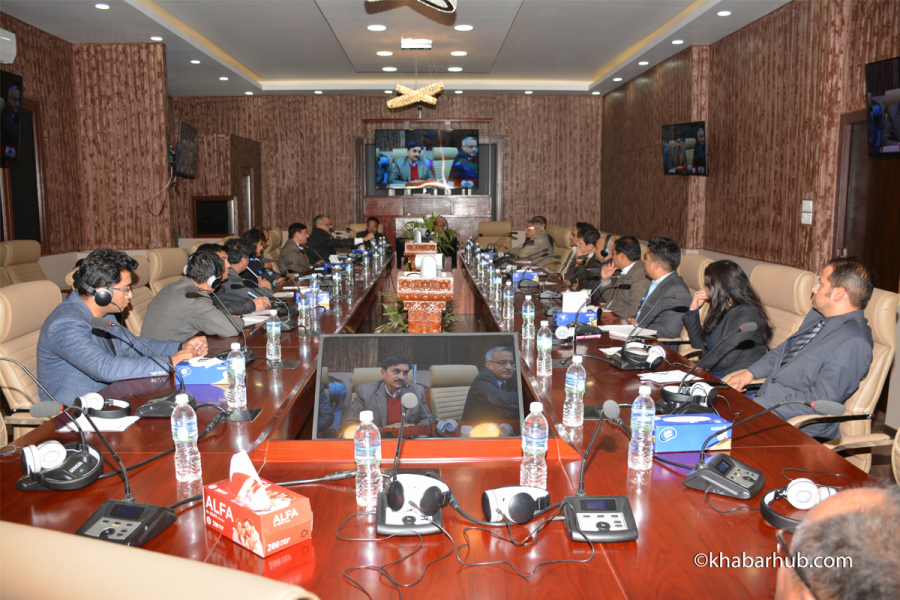
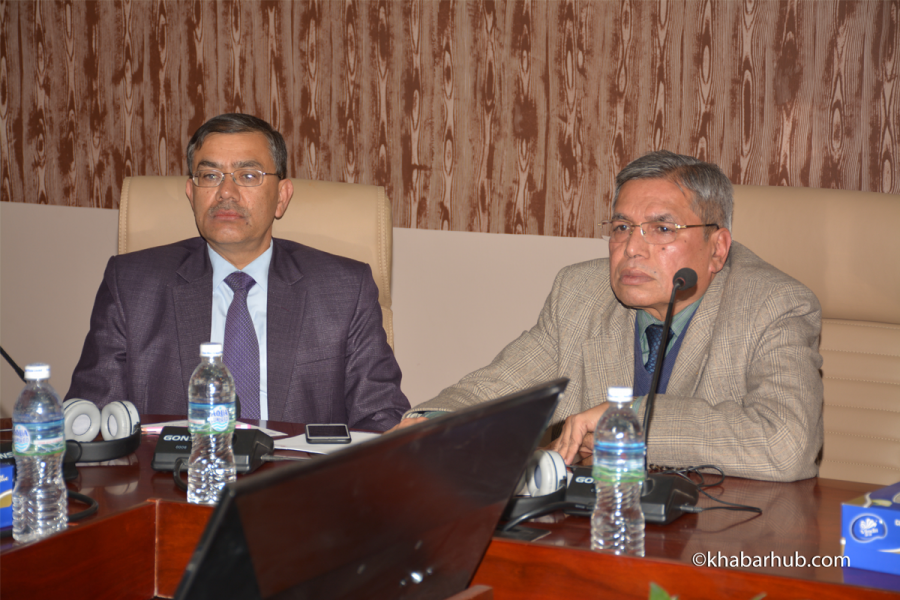
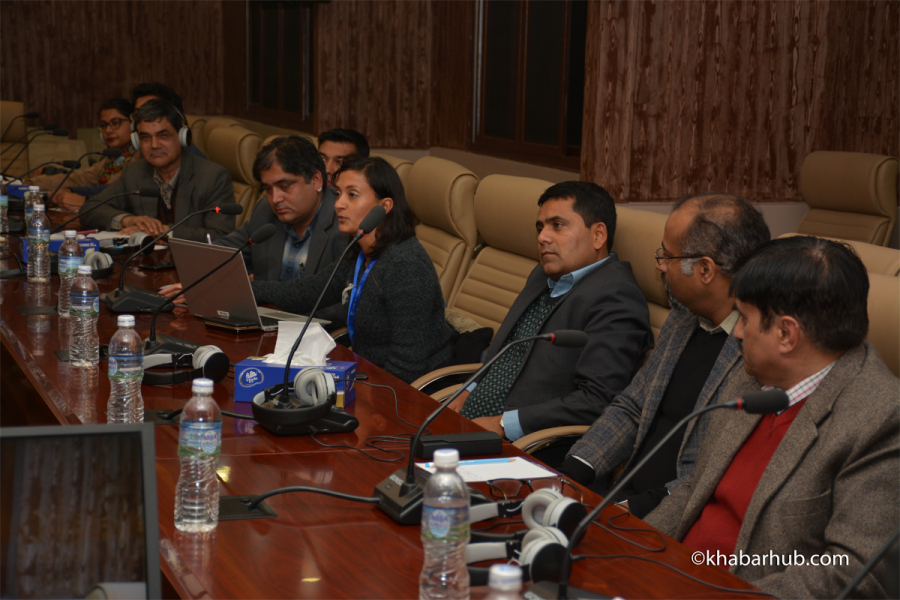
In an interaction organized by Institute for Strategic and Socio-economic Research (ISSR) with the support of International Labor Organization (ILO) at the Pavilion Media Hall in Kathmandu today, they suggested the government to enact expats-friendly laws, to create conducive business, and working environment in Nepal.
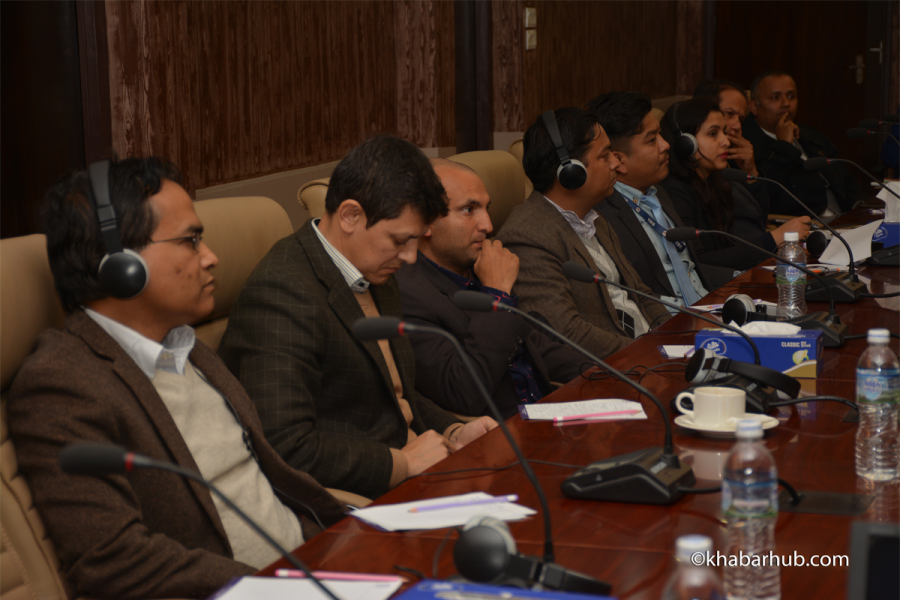
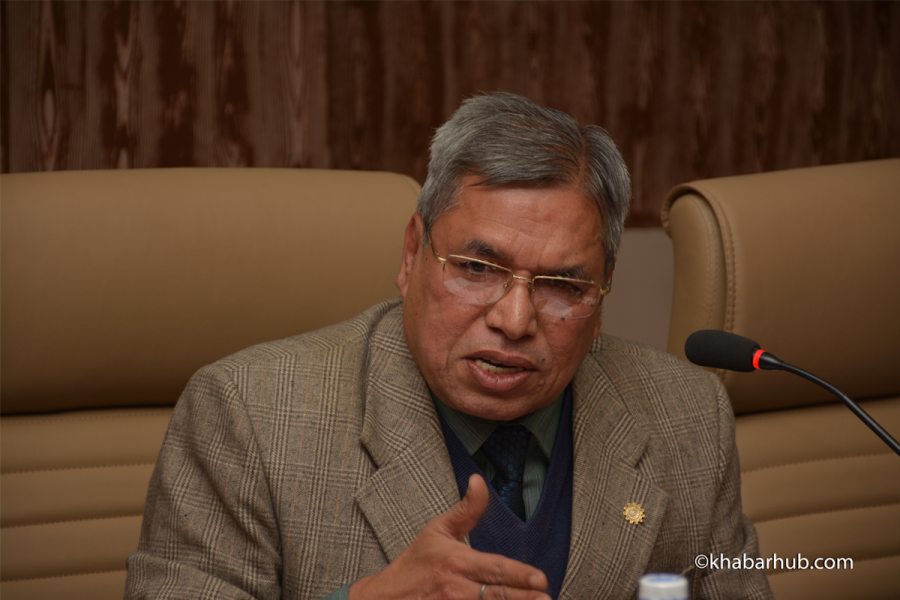
The complicated and lengthy work permit, and visa process have become extremely difficult to hire foreigners here, they said while urging the government to ease such issues to attract them. Some investors suggested that the five percent work quota for foreigners has been creating problem while stressing the need of increasing the percentage to fulfill the demands here.
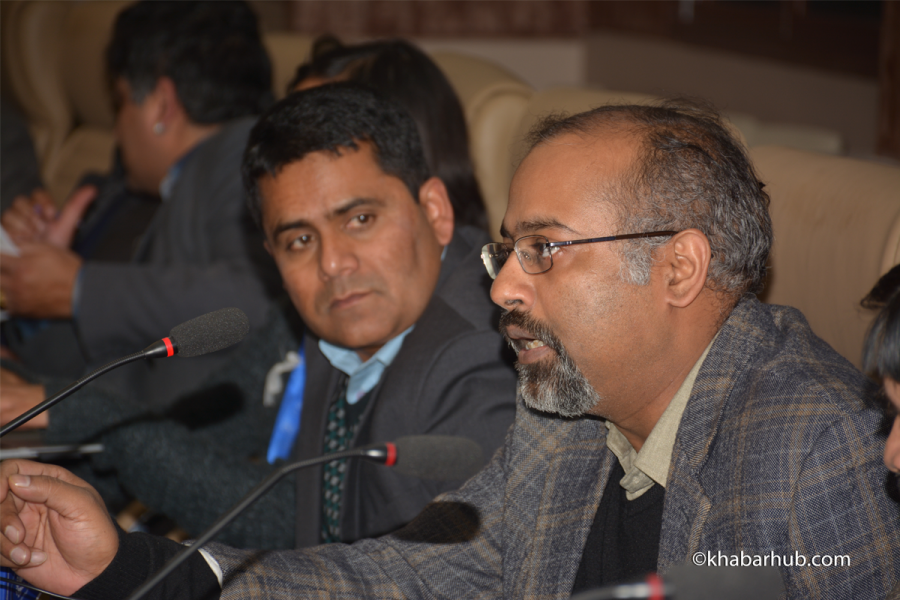

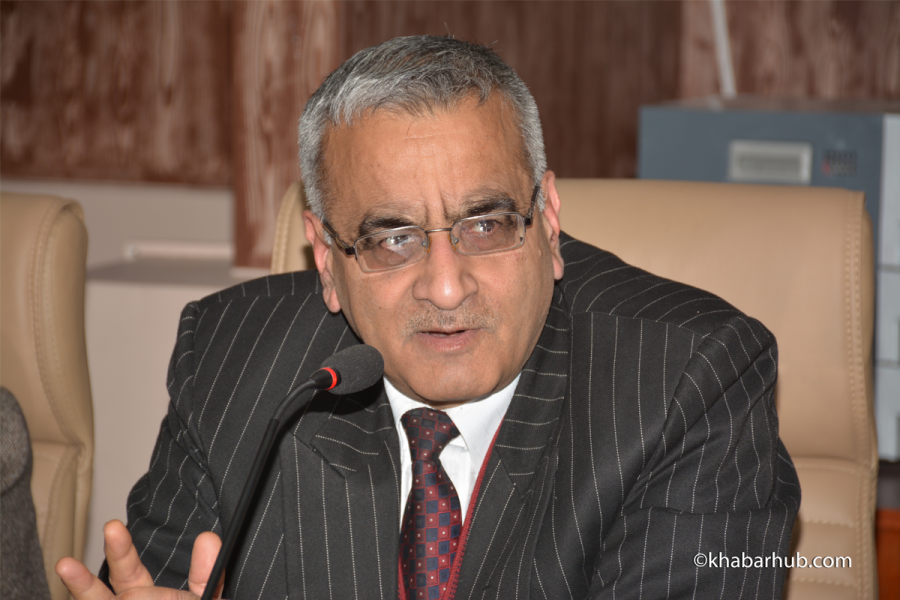
In the interaction organized on the eve of the Investment Summit in March 2019, they also focused on encouraging foreign investment and businesses.